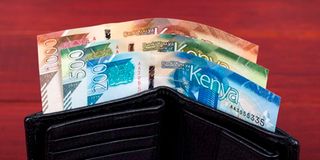How do I pay off my loans and save for my child’s school fees?

Money.
My name is Julius. I live in Nakuru. I have a daughter who will be joining school next year. I earn a net salary of Sh21,000. I have a Sacco outstanding loan of Sh166,000 of which I am paying Sh8,000 per month from my basic salary (Sh45,000). I also have other loans outside the Sacco of Sh40,000, of which I am lost on how to repay them from my salary. I have some side hustles from which I get Sh5,000 per month. I am also in a table banking group where I pay Sh4,000 from my salary. My rent and internet cost me Sh9,800 every month. Please advise me on how I can pay these loans and start saving on the side before the year ends.
It sounds like you need a financial plan to help you manage your debt and meet your goals. Let’s break things down. You currently earn a combined income both from your salary and side hustle of Sh26,000. Your expenses amount to Sh21,800. This is excluding the external loan of Sh40,000 of which you haven't stated the repayment amount.
This leaves you with a disposable income of Sh4,200. I would suggest prioritising your debt repayments for now. Since the Sacco loan is already factored into your expenses, you need to free up some funds to clear the remaining loans. You can do this by either negotiating with your lenders for a monthly repayment of say Sh4,000 per month based on your disposable income or you can review your table banking contribution downwards for now to Sh2,000 which will free an additional Sh2,000 to give you a total of Sh6,000 monthly towards paying down your debts.
Secondly, you will need to establish a monthly budget that outlines your spending plan within your current income. You can begin with the 50:30:20 recommended budgeting rule where you allocate 50 per cent of your income towards critical needs such as rent, food, and transport for now. This gives you Sh10,500.
Based on your current expenses, you have to review your living arrangements to fit within this allocation. 30 per cent of your income, which in this case is Sh6,300, would then go towards wants which include eating out, family entertainment and any other fun activities you might want to do.
Lastly, 20 per cent or Sh4,200 of your income would be allocated towards savings, and investments. I advise you to even limit further your wants for a certain period especially until you have paid down your debts. Once you have achieved this, make a commitment to live within your means and avoid taking on new debt as much as possible. To do this, you will need to set up an emergency fund that will cater for any eventualities.
Allocate at least Sh3,000 from the Sh6,300 towards your wants to start building this fund. It's advisable to save this money through one of the regulated Money Market Funds, better known as MM, where the funds will earn a decent interest compared to putting it in the bank.
Target to save between three to six months of your critical living expenses which gives you a target of Sh63,000. Next would be to explore additional income opportunities which will not only enable you to increase your savings and investments but importantly also help you start planning your daughter's education.
You can do this by reviewing your current side hustle and see whether it is possible to increase the income coming from it. You can also consider other possible opportunities in line with your skills such as freelance work or part-time jobs that will allow you to add to your income.
As your income increases, remember to stay disciplined by sticking to your budget so that you can allocate more money toward your future financial goals. Remember to regularly review your budget and expenses. Adjust your spending and saving strategies as necessary. If your side hustle income fluctuates, allocate it towards debt repayment first or savings based on your needs.





